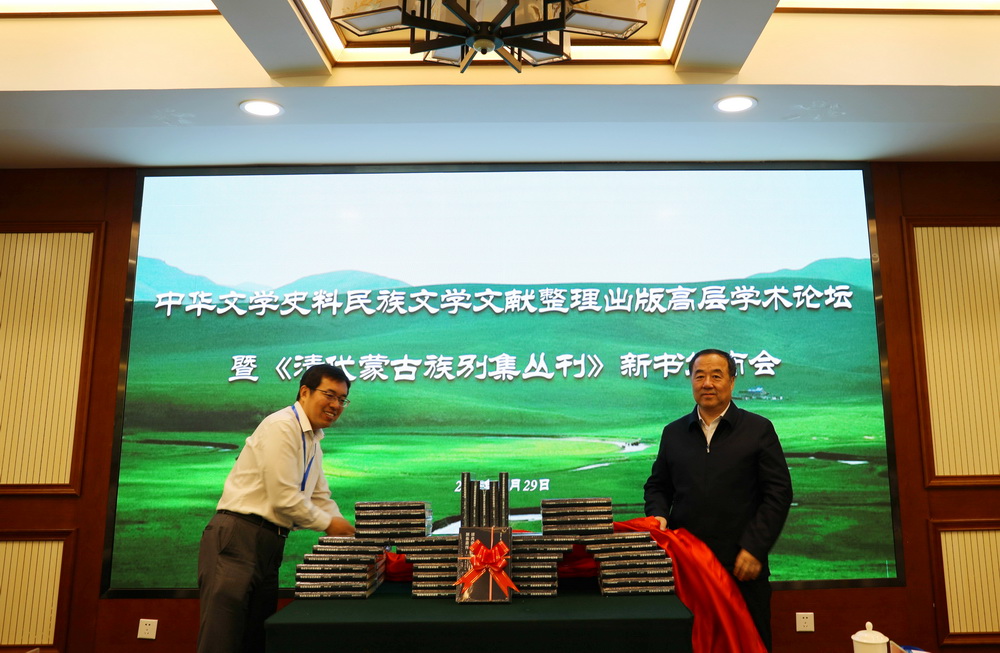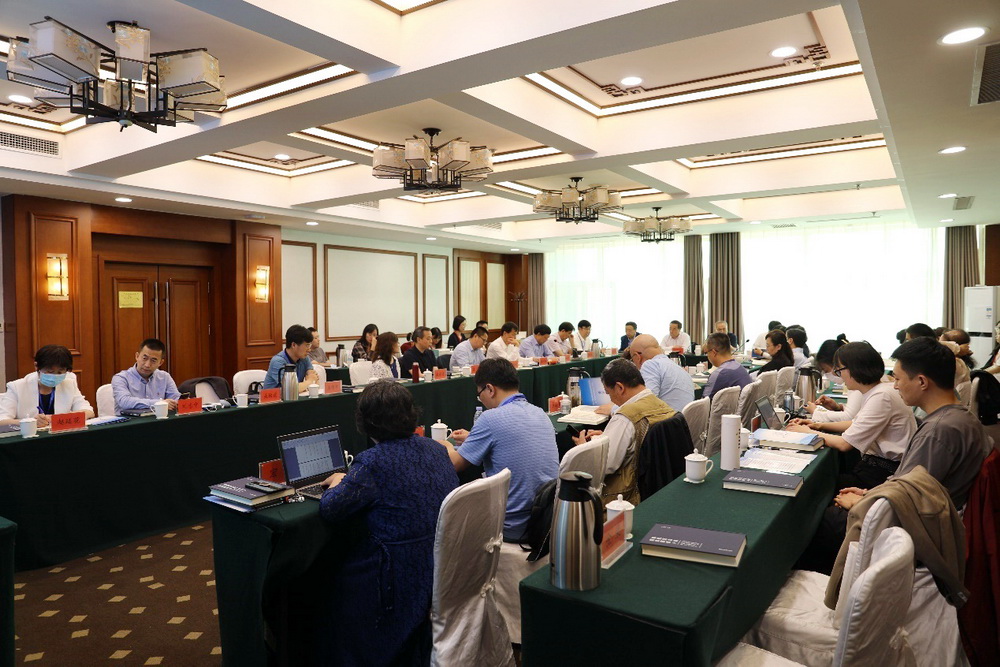On May 29, 2021, the College of Literature, Journalism and Communication (CLJC) held the high-level symposium on the historical records of the Chinese literature--historical records of minority literature of China and launch ceremony for Mongolian Literary Collections in Qing Dynasty(MLCQD)
Present at the symposium are renown scholars and experts from Chinese Academy of Social Sciences, Peking University, Beijing Normal University, Capital Normal University, Nankai University, Northwest University, National Library of China and SDX Joint Publishing Company. Liu Zhiyu, secretary of CPC Committee of IMU was present at and addressed the symposium. Prof. Erhimbayar, vice president of IMU, was present at the event and exchanged views with others in his address to the symposium. The launch ceremony for the new books was presided over by Qiao Wang, secretary of the CPC Committee of CLJC. Prof. Wei Yonggui, dean of CLJC, chaired the high-level symposium.

Liu Zhiyu, secretary of the CPC Committee of IMU and Wei Chong, director of National Library of China Publishing House(NLCPH), unveil the launch of the new books.
In his address, Liu Zhiyu pointed out that during his inspection of IMU on July 16, 2019, Xi Jinping, general secretary of the CPC Central Committee, stressed when he visited the Exhibiting and Reading Room for Ancient Mongolian Books that efforts should be made to collect, sort out and protect the ancient Mongolian books, and tap and carry forward the ideas of ethnic unity in the books to encourage the people of different ethnic groups to be united and striving together for a common prosperity and development. In order to carry out the spirit of the instructions of Xi Jingping, IMU has taken a series of measures to sort out, tap and study the ancient Mongolian books. The publication of MLCQD is the important achievement while IMU carries out the spirit of Xi’s instructions. On May 9, 2021, Xi Jinping, general secretary of the CPC Central Committee, pointed out in his letter to the editorial office of Journal of Chinese Humanities that to make it staunch and confident to be Chinese and have China better understood and known by the rest of the world, efforts should be made to have a deep understanding of Chinese civilization and deeply elaborate on how to stick to the path of China, carry forward Chinese spirit and gather the power of China from the perspective of the combination of history and reality and that of theory and practice. To answer this important question, the workers of philosophy and social sciences at IMU should recapture and deeply understand the instructions and ideas about the philosophy and social sciences work by Xi Jinping, general secretary of the CPC Central Committee, make concerted efforts, devote themselves to the study concerned to boost the creative transformation and innovative development of the splendid Chinese traditional culture and take actions to push forward the high-quality development of IMU’s work of philosophy and social sciences in a new phase.
Wei Chong, director of NLCPH, said in his address that NLCPH has always been attaching importance to its endeavor to edit and publish books about ancient Chinese literature, especially to its cooperation with experts and scholars, and successively provided a lot of literature concerned for the academic world. The publication of MLCQD is not only the continuation of NLCPH’s endeavor in ancient Chinese literature but also its new attempt to further tap and broaden the special subject of literary materials. The MLCQD is vital in discovering the integration of Mongolian literature and Chinese literature in ancient China and revealing the important role of the integration in Chinese traditional culture. In the future, NLCPH and IMU will cooperate on the succeeding projects of the Supplementary Volume of MLCQD and Mongolian Literary Collections in Yuan Dynasty and Ming Dynasty and contribute more to carrying forward the Chinese civilization.

Opinion-exchanging
Prof. Erhimbayar pointed out in his address to symposium that at present IMU’s disciplines of Chinese language and literature, history, ethnology, philosophy and Marxism are working together to explore the philosophy of ethnic unity in ancient Mongolian literature to boost the ethnic unity and harmony, forge a strong sense of the community of the Chinese nation and thoroughly put into practice the spirit of the important speeches and instructions given by Xi Jinping, general sectary of the CPC Central Committee during his inspection of IMU. He said that the publication of MLCQD manifests in the form of books the unique shape and history of Mongolian literary creation in Qing Dynasty, describes the historical process of the integration of Chinese literature and culture and those of Mongolians and provides the support for structuring the completely systematic academic lineage of the historical recordss of the integration of Mongolian and Chinese literature in Qing Dynasty and form the literature and data basis for the history of the integration between Mongolian literature and Chinese literature in ancient China. Erhimbayaer also stressed that the team of the project of “the Sorting and Study of the Historical Recordss about the Integration of Mongolian Literature and Chinese Literature” should pour more energy into exploring the historical process of the integration of Mongolian literature and Chinese literature in ancient China and find out the important role played by the integration in the formation of the spirit of Chinese literature and Chinese cultural traditions.
The experts present at the symposium unanimously agreed that MLCQD is not only literary texts but also literary records and literary historical materials. They thought it sets a significant foundation of historical records for the study of Mongolian literature. In the ensuing study the team of the research project can explore the historical process of the integration of Mongolian literature and Chinese literature in ancient China, which is very important in broadening the horizon on the study of the historical materials of Chinese literature, boosting the further study of the historical materials about minority literature of China and gathering cultural power for forging a strong sense of the community of the Chinese nation.
The 40 volumes of MLCQD launched at the symposium are a phased achievement of Prof. Mi Yanqing’s (who is with CLJC of IMU) vital project funded by the National Social Science Foundation--“the Sorting and Study of the Historical Records about the Integration of Mongolian Literature and Chinese Literature in Yuan Dynasty, Ming Dynasty and Qing Dynasty”, a phased achievement of “the Research on the Relations between Mongolian Culture and Chinese Culture”-- a project of “the Key Regional Talent Team Supported in the Field of Publicity, Thought and Culture” under the Publicity Department of Inner Mongolia Autonomous Region CPC Committee and the achievement of the industry innovation talent team under the “Grassland Elite Project” of Inner Mongolia. The publication of MLCQD is supported by the first-class discipline construction fund of IMU and NLCPH publishes the collections.

